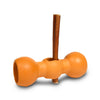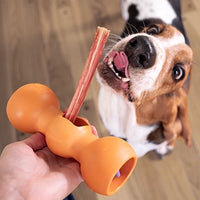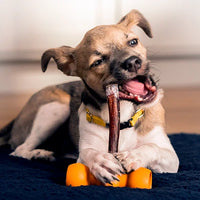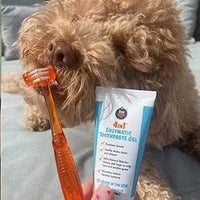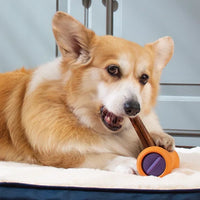The Fourth of July, or any other day where communities celebrate with fireworks can be a very bad day for dogs. The loud booms, cracks, and pops can create intense anxiety in our pups, leading to this sobering fact: More dogs are lost on the 4th of July than any other day of the year (1). In this post, learn why dogs can react this way to fireworks, some tips to help protect them, and expert advice on how to soothe your pups this Independence Day.
Just like humans, dogs are evolutionarily hardwired to be afraid of loud, sudden noises; most notably, thunder, gunshots, and fireworks. The fear responses that we see in our dogs each July 4th, can include crying, barking, destructive behavior, excessive licking/drooling, hiding, shaking and more. These behaviors all indicate a type of response to an actual perceived danger (2). Even more worrisome, is the risk of dogs' instinct to flee, desperately trying to escape the noise and not being able to, causing them increased anxiety.
Prepare your pup
In the days and weeks leading up to firework festivities, ensure that your dog’s ID tags are up-to-date and secure, and if they are microchipped, be sure your contact information is current. Use a microchip checking system to be sure all information is accurate.
Another great way to prepare your pup is by tiring them through various physical and mental activities to help burn off extra energy in a positive way. Taking them for walks or playing fetch earlier in the day will help wear them out and make rest more easily attainable. You can even use their evening meal as a way to mentally enrich them, providing this extra mental stimulation will support a calm mental state and tire them, too. To do this, you can “scatter” their food outside in the grass (feed earlier in the afternoon to avoid premature fireworks) or feed them a frozen meal in a puzzle toy (no matter what you feed, add water to their food and freeze–it’s that easy!) By feeding earlier in the afternoon, you can make final bathroom breaks occur prior to the firework frenzy ensuring your pup a more comfortable evening.
Need extra help and have extra time? If you know your dog experiences severe anxiety during fireworks displays, consider positive reinforcement training leading up to the 4th. Find a recording of fireworks, play it softly while your dog is home in a comfortable place, and reinforce with plenty of tasty treats, play, and praise. In time, gently raise the recording’s volume to get your dog prepared for the real thing. (This is known as desensitizing your dog. It may be beneficial to work with a trainer if you have an extremely sensitive pup.)

Gentle music or white noise can help soothe your dog
Know your dog! If your dog is scared of fireworks, there is absolutely no reason to take them out to your local fireworks display. Keep them home, where they are safe and at their most comfortable. If their crate is their safe space, feel free to put their bed inside and drape heavy blankets over the crate–but never close the door–as they could possibly injure themselves trying to escape in a panic.
Make the inside time fun! Distract your dog inside the home with their favorite games, practice some obedience skills or try placing treats around the home for them to find. Putting dogs “to work” in the ways just mentioned is a great way to divert their attention to something productive. Once their focus starts to be replaced with fear, due to the onset of fireworks, it’s time to stop–we don’t want to create an unpleasant association with usually fun behaviors (3).
Need another great way to distract your pup? Offer them the opportunity to engage in an instinctual behavior, like chewing (this will not work if your dog is already in an agitated state. For the best outcome, provide this chew just before the onset of fireworks.) The repetitive action of chewing releases serotonin and dopamine, two important neurotransmitters in the brain that support mental health. Choose a long term chew, like an appropriately-sized bully stick, and let them chew for at least 10 minutes (4).
Once the fireworks start, make sure all the windows and doors are closed to keep out upsetting sounds and draw the blinds or curtains to help minimize flashing lights. You may also want to add white noise (like a fan on high) or gentle, classical music to add a calming ambiance and drown out excess noise.

Chewing for 10+ minutes can help reduce anxiety before it starts
If your dog is still distressed, there are supplements and soothing items available on the market. A thunder jacket or dog earmuffs may help comfort them. A thunder jacket provides a tight, hug-like fit, and earmuffs can muffle the volume coming from outside the house (5). Calming remedies can be especially helpful if all else fails. Look for products that contain nervine herbs, which can relax without sedating. You can also look to add full-spectrum CBD to help keep them calm–the delivery form you use depends on the need–if you need quick relief, oil-form is best. If you have some time in advance, a chew form can also work. Just be mindful that anything that has to go into the digestive tract will take a bit longer to take effect.
References:
- https://www.akc.org/expert-advice/health/prepared-pets-go-missing-july-4-5-day/
- https://www.sciencedirect.com/science/article/abs/pii/S016815911200367X
- https://www.akc.org/expert-advice/training/coping-with-loud-noises/
- https://www.bowwowlabs.com/blogs/news/what-is-a-long-term-chew-and-why-does-my-dog-need-it
- https://www.realclearscience.com/articles/2019/07/04/why_dogs_hate_fireworks_and_how_you_can_help_them_111028.html
The points of view expressed above are those of our clinical pet nutritionist and supported by science, her education and experience. However, we recognize there may be different points of view or opinions on some aspect or even the premise of this article. Our goal at Bow Wow Labs is to provide the best, clearest, and most helpful information possible to help keep your dog happy, healthy and safe.
This article is for informational purposes only. It is not, nor is it intended to be, a substitute for professional medical or veterinary advice, diagnosis, or treatment and should never be relied upon or perceived as specific medical or veterinary advice.


